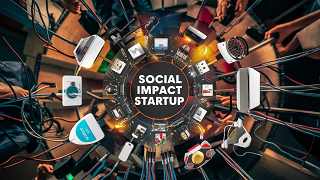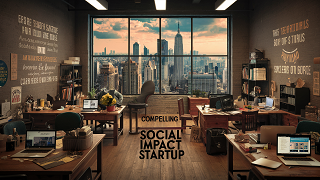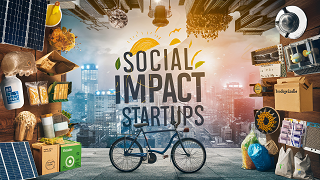
Social Impact Startups
The traditional model of business, with its singular focus on shareholder value and maximizing profit, is facing a shift. A generation of entrepreneurs is challenging this paradigm, prioritizing social and environmental impact alongside financial success. These are the Social Impact Startups and their influence is rapidly increasing in the US business landscape.
Defining the Mission
A social impact startup isn’t merely a product or service provider; it tackles critical social or environmental challenges through innovative solutions. This mission is woven into its fabric, guiding its operations and decision-making processes. Unlike traditional CSR (Corporate Social Responsibility) initiatives, social impact is embedded in the company’s DNA,r transcending mere lip service.

Key Characteristics
Several defining characteristics differentiate social impact startups from their traditional counterparts.
Social/Environmental Focus: Their core mission addresses a specific social or environmental need, such as access to clean water, sustainable agriculture or affordable healthcare.
Innovative Solutions: They develop and implement creative approaches to tackle these challenges, often leveraging technology, collaboration and partnerships.
Measurable Impact: They measure and track their social and environmental impact alongside financial performance, demonstrating the positive change they create. This impact assessment might involve metrics like carbon footprint reduction, job creation, or improved educational outcomes.
Sustainability: They ensure their operations and business practices are themselves sustainable, minimizing their environmental footprint and fostering ethical sourcing. This includes considerations like fair wages, responsible waste management and responsible supply chain practices.

Benefits and Drivers
This mission-driven approach offers several advantages for these startups.
Attract and Retain Talent: Millennials and Gen Z, increasingly motivated by purpose-driven work, are attracted to companies addressing crucial social and environmental issues. This allows startups to attract and retain talented individuals who want their work to make a difference.
Enhanced Brand Loyalty: Consumers, especially younger generations, increasingly seek out brands that align with their values. This leads to stronger brand loyalty and customer engagement, as consumers become brand advocates and ambassadors.
Attract Investment: Impact investors are actively seeking socially responsible businesses, providing access to funding and support. This opens up new avenues for financing and allows startups to focus on their mission without solely relying on traditional investors.
Competitive Advantage: Unique solutions addressing social and environmental concerns can create a competitive edge in the marketplace. By offering products or services that resonate with consumer values and address societal needs, these startups can differentiate themselves from traditional competitors.

Growth and Momentum
The social impact startup scene is experiencing significant growth in the US.
Funding Rise: Between 2022 and 2023, impact investments in the US increased by 43%, reaching more than $70 billion. This demonstrates the growing interest in socially responsible businesses and the increasing availability of funding for these startups.
Startup Creation: Over 300 new social impact startups emerged in the US in 2023. This rapid growth signifies the entrepreneurial spirit and increasing awareness of the need for innovative solutions to social and environmental challenges.
Sector Diversity: These businesses operate across various sectors, including healthcare, energy, education, food systems and financial inclusion. This wide range demonstrates the diverse applications of the social impact model and its potential to create positive change in different spheres.

Examples of Impact
Numerous successful social impact startups demonstrate the power of this model.
Seventh Generation: This company sells eco-friendly household products, advocating for environmental sustainability and responsible consumption. Their commitment to sustainable packaging and plant-based ingredients resonates with environmentally conscious consumers.
Tentree: This apparel brand plants trees for every product sold, contributing to reforestation efforts and combating climate change. They directly connect their product purchase to a positive environmental impact, fostering customer engagement and brand loyalty.
Year Up: This organization provides job training and mentorship to underserved communities, promoting social mobility and economic opportunity. Their focus on workforce development and inclusion addresses a critical societal need while creating a pipeline of skilled and talented workers for various industries.
Greenpeace Energy: This energy provider sells renewable energy to consumers, fighting climate change through clean power solutions. They offer individuals and businesses a way to directly contribute to the transition to renewable energy while supporting a mission-driven organization.

Challenges and Considerations
While promising, the social impact startup field faces challenges.
Balancing Mission and Profit: Striking the right balance between social impact and financial sustainability can be complex. Some may question the long-term viability of prioritizing social impact, while others might struggle to demonstrate a clear link between their impact and profitability.
Measuring Impact: Determining and communicating the social and environmental impact accurately can be challenging. Developing robust and transparent metrics and frameworks for impact assessment is crucial, but not always straightforward.
Accessing Funding: Traditional investors may be hesitant to invest in companies prioritizing social goals over immediate profit. This can make it difficult for startups to secure funding, especially in their early stages.
Market Competition: Social impact startups often operate in competitive markets dominated by established players. Finding their niche and effectively conveying their unique value proposition is essential to stand out.
Scaling Impact: Scaling their impact and reaching a wider audience can be challenging for startups. Building partnerships, leveraging technology and replicating successful models are key strategies for overcoming this hurdle.
Building a Sustainable Future
Despite these challenges, the rise of social impact startups represents a significant shift in the business landscape. They are paving the way for a future where profit and purpose go hand-in-hand, creating a more just and sustainable world.
Supporting the Movement
Several ways exist to support and encourage the growth of social impact startups.
Investing in Impact Funds: Invest in funds dedicated to socially responsible businesses, providing financial support and expertise.
Choosing Impactful Brands: Purchase products and services from companies demonstrating a commitment to social and environmental impact. Look for certifications like B Corp, Fair Trade or LEED to identify these businesses.
Spreading Awareness: Share information about social impact startups and their missions through social media, word-of-mouth and other channels. This can help raise awareness and attract potential customers, investors and collaborators.
Providing Expertise: Volunteer your skills and knowledge to support these businesses. Whether you offer marketing assistance, pro bono legal advice or technology expertise, your contribution can make a difference.
Supporting Policy Initiatives: Advocate for policies that encourage and support social impact businesses, such as tax breaks, access to funding and streamlined regulations.
Conclusion
The social impact startup movement is gaining momentum in the US offering a promising alternative to traditional business models. By blending purpose with profit, these companies are tackling critical social and environmental challenges while demonstrating the potential for financial success. As awareness grows and support increases, this sector is poised to play a key role in shaping a more sustainable and equitable future.
Additional Resources
B Lab: https://bcorporation.net/
Net Impact: https://netimpact.org/
Ashoka: https://www.ashoka.org/














